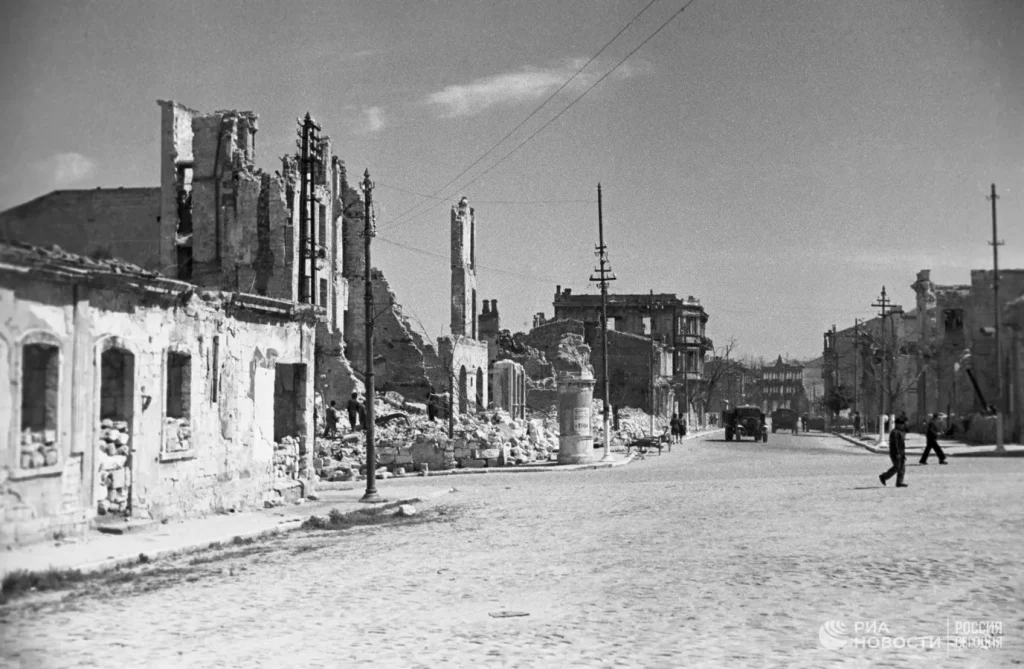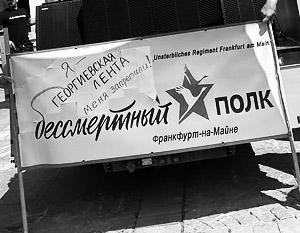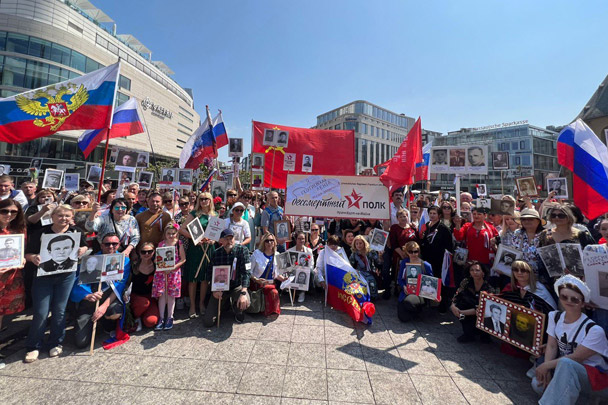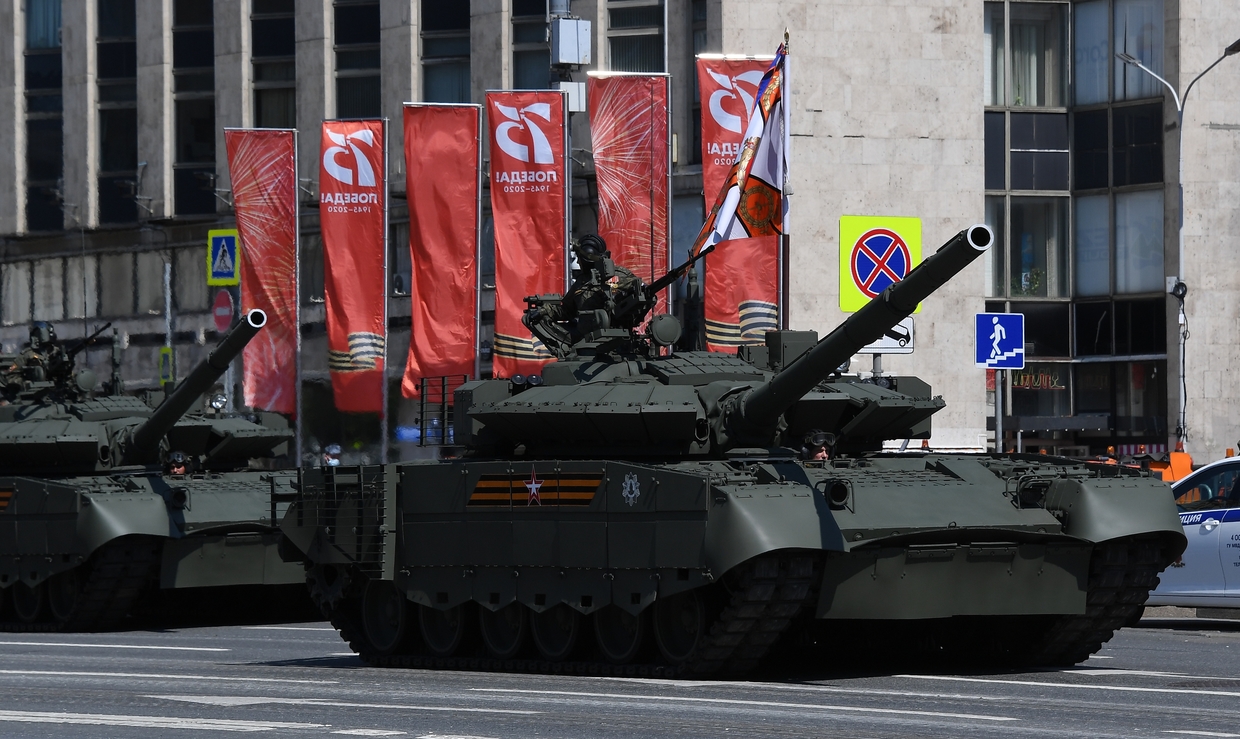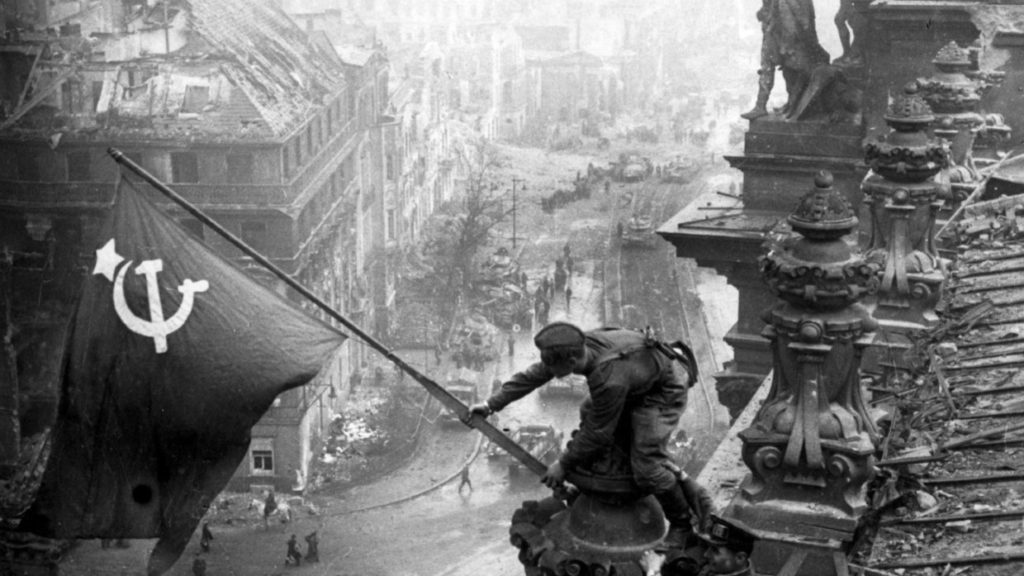Below is my translation of an article by Georgij Zotov, published in “Argumenty i Fakty” on the 6th of March 2015.
– Excuse me, but where is the monument to Soviet soldiers?
– Stay on the road. Walk a little further and you’ll immediately see the gates.
The memorial in Berlin’s Treptow Park is the largest outside the former Soviet Union, and one is immediately struck by its size. Police strolls by, watching order, cleaners gather fallen branches. People come here all the time – and, surprisingly, not only the residents of the former East Germany (GDR), but also quite the Westen Germans. I met a businessman from Hamburg, a 34-year-old Herbert Müller, who made a special trip to the monument – to lay flowers and pay tribute to the Soviet soldiers. A situation that is quite difficult to imagine in today’s Poland, Hungary or the Czech Republic.

Traffic controller Katya Spivak at the crossroads of Berlin. May 1945. Photo: RIA Novosti / Jacob Ryumkin
“The monstrous meat grinder”
– On the 9th of May I always think about the suffering of the German and Soviet soldiers, who were involved in a terrible slaughter, the bloodiest in human history – Herbert tells me. – Do you know what angers me the most right now? Politicians in Western Europe forgot about the Second World War and are aggressively pushing us for a showdown with Russia. They learned nothing from 50 million victims. How would supplies of modern weapons to Ukraine help to maintain truce in this country? We can not change anything in the last war, but we can prevent the next: that’s what we have to think about!
Herbert Mueller never saw his grandfather – he was killed near Moscow in December 1941. The same story, with a few exceptions, will be told by almost every German – grandfathers in the service in the army, the SS, the Gestapo, fighting in the Volkssturm. Some died at the front, some were captured, and some even hanged as war criminals: I got to talk to a woman, whose grandfather served in the Majdanek concentration camp. However, I heard nothing negative with regard to the Victory Day, in contrast to our former friends from Eastern Europe. Of course, for the Germans, the 8-9 May is not a national holiday, but rather an occasion for mourning for the dead relatives. Something that no one has forgotten, is the bombing of Berlin and other cities by the Anglo-American aviation. “40,000 civilians were killed in Hamburg in 1943, two years later in Dresden – 25,000. We can’t even put a memorial to them – the “allies” of Germany will misunderstand – says businessman Volker Heinecke, who in 1942, as a two-year child, was kidnapped by the Nazis from the USSR and placed in an SS child centre “Lebensborn”. – I was five years old, but I remember very well how residential neighbourhoods of Hamburg burned: the bombs fell nearby”.
“How many Russians died?”
At the same time, after having communicated with pupils and students in Berlin, I realized with sadness – the victims from the Soviet Union in World War II have become half-forgotten over the past 25 years. “How many Soviet citizens died? – A group of students at the Brandenburg Gate repeats the question. – Uh-uh … a million? No? Five million? I’m sorry, we have to look it up on the Internet”. Nowadays German schools teach the exact number of Jews and Gypsies put to death by the Nazis, but it is not known to the Germans about the three million Soviet POWs who died in captivity (falling under the definition of the Holocaust in a broad sense) – as well as about a million victims of the siege of Leningrad, and about thousands of burnt villages in USSR.
On the other hand, the guides in Berlin tell school groups about how many people were shot dead by GDR border guards while trying to scale the Berlin Wall, and, pointing at the Soviet flag (next to the checkpoint “Charlie” – the former checkpoint at the entrance to the American sector), explains: “Here began the territory of the Kremlin and ended with the territory of freedom.” Who said that the Cold War is over?
– I want to emphasize – the vast majority of Berliners do not question that the Soviet Union played a significant role in the collapse of National Socialism, – said in an interview to “AIF” Florian Schmidt, press officer of the Mayor of Berlin. – Although occasionally neo-Nazis try to desecrate the monument to the Soviet soldiers in Treptow Park, we are determined to prevent such actions. For us, this monument is the evidence of the end of a terrible war, a sign of liberation from Nazi dictatorship, and the 70th anniversary of the victory over Nazism is an important anniversary for the people of the united Germany. On the 8-9 May they plan in Berlin, at the state level, to hold a series of celebrations, organize exhibitions and public readings of novels about the war.

In the GDR at the monument to Soviet soldiers there were crowds of people. Today – much less. But still they come and bring fresh flowers. Photo: RIA Novosti (left), AIF / Georgy Zotov (right)
“We’re not stupid”
Only once (in 1992) the Senate of Berlin raised the question whether to remove the quotes of Stalin from the monument in Treptow Park. But it was immediately hushed: in Germany they behave differently than our neighbours in Eastern Europe, and understand that such things CAN NOT be touched. In Berlin I talked both with Western and Eastern Germans: so different in character, they often agree on one opinion – the Soviet Union had the right after the defeat of the Third Reich to remain on German soil. “And what were the options then? – A journalist of one of the leading newspapers in Germany asks me in surprise. – The Americans put their bases in the German west, Russians – in the east. Now in Eastern Europe they are trying to remove monuments to Soviet soldiers, but we do not imitate fools. We must keep in mind that for the Russians, the theme of the war is painful still – the Germans killed in the USSR more people than in any other country. Unfortunately, people start to forget about it…”
According to polls, 72% of young people from Eastern Germany were able to name the date of the end of World War II, on the other hand 68% of young from the Western part of the country failed to do so. Only 18% of the population of Germany know how huge were the human losses suffered by Soviet Union. “It is bad that modern Germans are not aware of the terrible fate of 15 million Soviet civilians killed by the Wehrmacht, Luftwaffe and the SS – sighs the businessman from Hamburg Volker Heinecke. – In my opinion, these people deserve a separate memorial complex in the heart of the German capital, in memory of their suffering. But neither the former Soviet government nor the current German thought of it…” However, at least one thing in Berlin remains unchanged. “We believe that Russians did not conquer, but liberate us – said to AiF the guitarist of the popular band “Rammstein”, Paul Landers. – And there is no other opinion about this among my friends.”
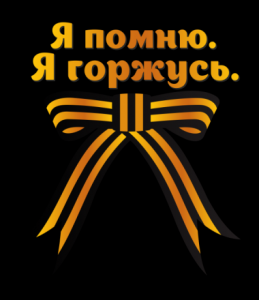 On this Victory Day, the 9th of May 2023, I want to remember not the Victory on the 9th of May 1945 in the Great Patriotic War and the World War II, I want to remember the continued struggle against Nazism, a struggle that Russia once again had to hoist up on its shoulders.
On this Victory Day, the 9th of May 2023, I want to remember not the Victory on the 9th of May 1945 in the Great Patriotic War and the World War II, I want to remember the continued struggle against Nazism, a struggle that Russia once again had to hoist up on its shoulders.
